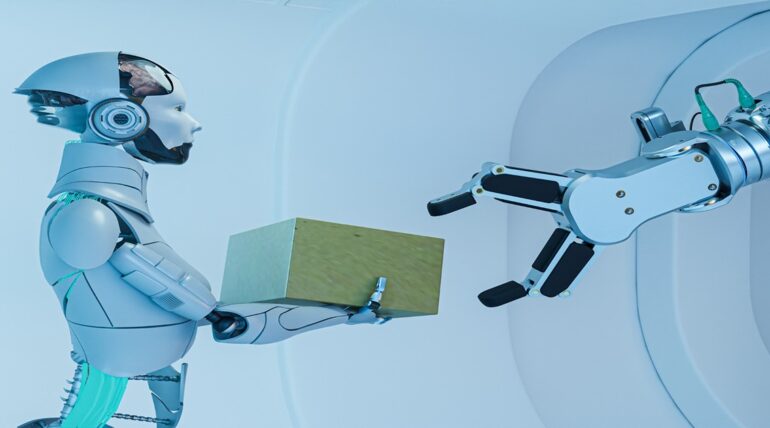
Artificial Intelligence (AI) is changing how businesses work, automating, improving efficiency, and enabling data-driven decision-making. From healthcare to manufacturing, AI redefines industries by increasing productivity and simplifying complex processes.
In this blog post, we will explore how AI is changing industries and the future of automation.
How AI Boosts Productivity and Automation
AI-powered tools help businesses be more efficient by handling repetitive tasks, analyzing big data and making accurate predictions. Here are the benefits:

- Time-Saving Automation: AI automates mundane tasks, reduces manual effort and increases productivity.
- Data Driven Decision Making: AI processes huge amounts of data to provide insights and better business strategies.
- Cost Reduction: Automation reduces operational costs and minimizes human errors.
- Better Customer Experience: AI-driven chatbots and recommendation systems improve customer interaction.
Let’s get into how AI is changing industries.
1. AI in Healthcare
AI has changed healthcare by improving diagnosis, patient care, and research.
- AI in Healthcare:
- Medical Imaging and Diagnostics: AI algorithms analyze X-rays, MRIs and CT scans to accurately detect diseases.
- Virtual Health Assistants: AI chatbots and virtual assistants provide medical advice and appointment scheduling.
- Predictive Analytics: AI predicts disease outbreaks and helps in early diagnosis and treatment planning.
AI solutions make things more efficient and cost-effective while improving patient outcomes.
2. AI in Manufacturing
Manufacturing industries use AI to optimize production lines, control quality, and predict maintenance needs.
- AI in Manufacturing:
- Smart Robotics: AI robots do repetitive and hazardous tasks, increasing productivity.
- Predictive Maintenance: AI detects machine failures before they happen and reduces downtime.
- Supply Chain Optimisation: AI predicts demand, manages inventory, and optimizes logistics.
AI-driven automation makes things more efficient, reduces waste, and speeds up production.
3. AI in Retail andE-commercee
Retailers use AI to improve customer experience, personalize marketing, and manage inventory.
- How AI is Impacting Retail:
- Personalised Recommendations: AI recommends products based on customer preferences.
- Chatbots for Customer Support: AI chatbots provide instant support and answers.
- Automated Inventory Management: AI forecasts demand and optimizes stock levels.
By using AI, retailers increase sales and customer satisfaction and reduce costs.
4. AI in Finance and Banking
Financial institutions use AI for fraud detection, risk assessment, and customer support.
- AI in Financial Services:
- Fraud Detection: AI detects unusual transactions and prevents fraud.
- Automated Trading: AI algorithms analyze market trends and trade.
- AI Chatbots: Virtual assistants answer banking queries and help customers.
AI secures and improves decision-making and optimizes financial services.
5. AI in Education
AI is changing education by personalising learning experiences and automating admin tasks.
- AI in Education:
- Personalized Learning: AI delivers content based on student performance.
- Automated Grading: AI-powered systems grade assignments and exams fast.
- AI Tutors: Virtual tutors explain complex subjects to students.
AI increases learning efficiency and provides personalized education solutions.
Future of AI
AI will get more interesting more innovations across industries:
- AI Assistants: AI-powered virtual assistants with human-like capabilities.
- AI & IoT: Smart devices talking to each other for automation.
- Ethical AI: Transparency and fairness in AI decision making.
As AI advances, businesses must adapt to be competitive in the digital age.
How artificial intelligence is revolutionizing industries?
AI automates tasks, makes decisions, and makes things more efficient. It helps businesses analyse large amounts of data faster. AI solutions optimise processes, cut costs, and improve customer experience.
How is AI used to help businesses to improve productivity?
AI automates repetitive tasks so employees can focus on more strategy. It improves data processing, predictive analytics, and workflow optimisation for better decision-making. AI-driven tools like chatbots, CRM systems, and smart automation simplify business operations.
How does AI increase automation?
AI systems automate manual processes, reducing human intervention in repetitive tasks. Technologies like machine learning, robotic process automation (RPA), and AI-driven software optimise workflows. AI makes industries like manufacturing, healthcare, and logistics more efficient.
How has AI increased productivity?
AI increases productivity by reducing human error, speeding up processes, and optimising resource management. Through smart automation, it improves communication, customer service, and operational efficiency. AI-driven analytics helps businesses make faster, data-driven decisions for growth.
Wrapping Up:
AI tools are disrupting industries by increasing productivity, automating processes, and driving innovation. From healthcare to finance, AI-powered solutions optimize operations, reduce costs, and improve customer experience. As AI becomes more interesting, businesses that adapt will be more competitive.